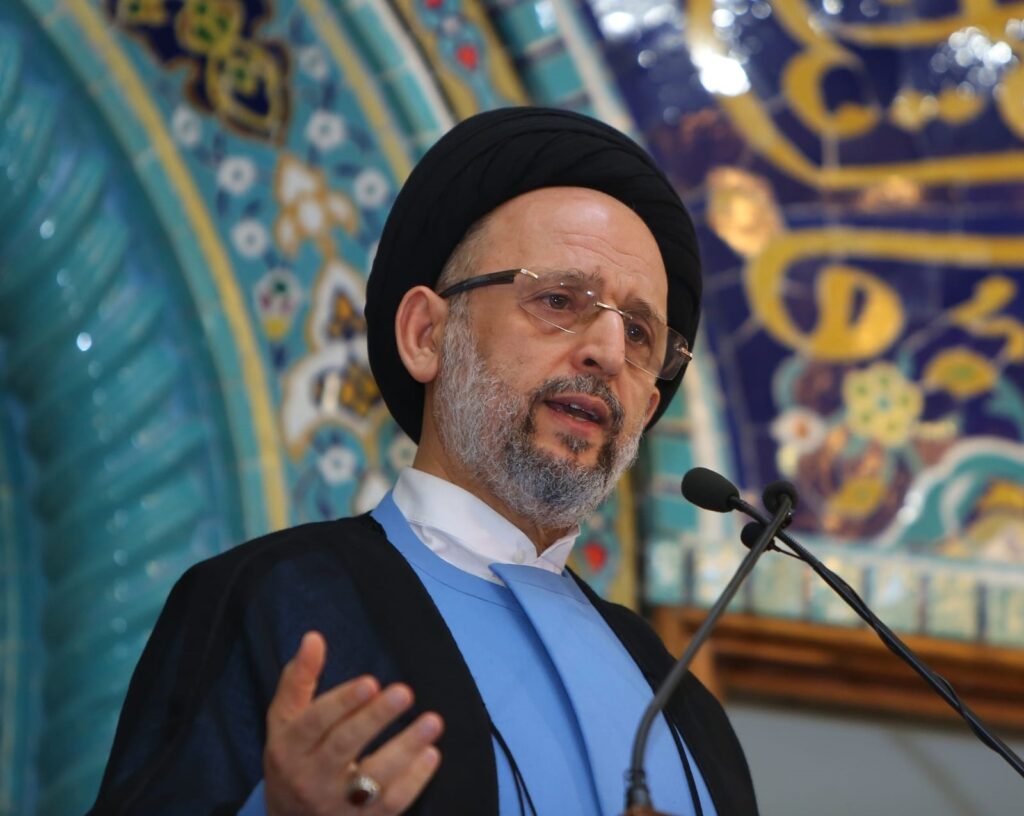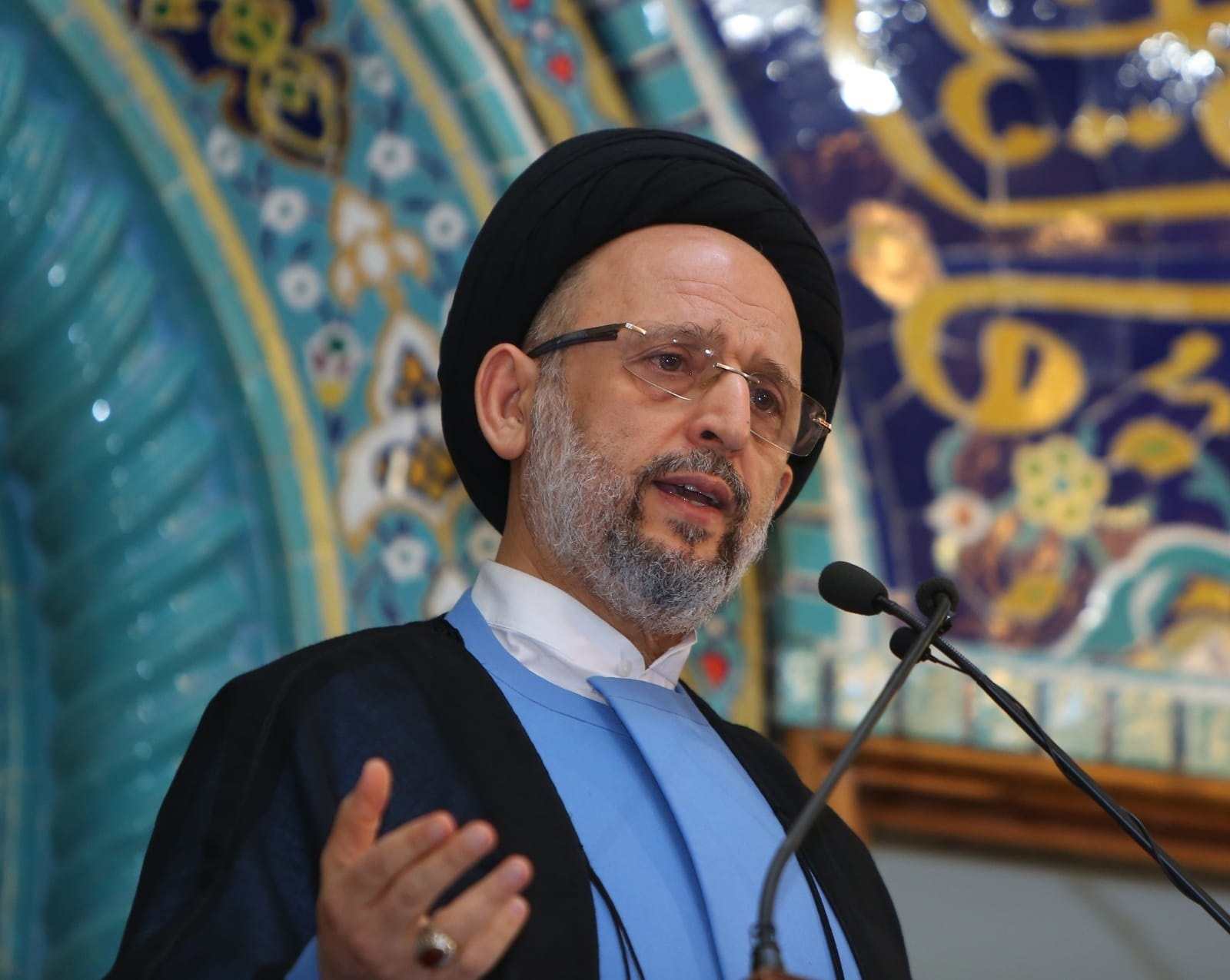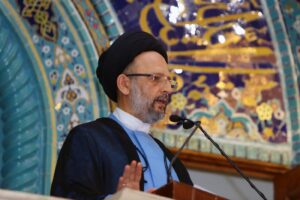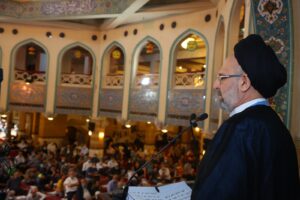In The Name of Allah, The Compassionate, The Merciful.
His Eminence, Sayyed Ali Fadlullah, delivered the two Friday prayer sermons at the Imamain Al-Hassanain Mosque, Rabi II 5, 1445 /October 20, 2023. Several prominent religious scholars, dignitaries, and hundreds of believers attended the Jumu’a prayer. Following is a summary of the sermons.
The first sermon
Allah, The Most Exalted, says in His Glorious Book: Your Lord has said: ‘Call upon Me, and I will answer you. Indeed, those who disdain My worship will enter Hell [rendered] contemptible. Allah, The Most Exalted, speaks the Truth.
In this verse, Allah, the Most Exalted, pointed out that life in this world will not always be the way we want it to be, with all the difficulties and challenges it brings. He reminds us that life involves hardships, trials, and challenges, as He confirmed: “We have certainly created man in hardship” and “And We will surely test you with something of fear and hunger and a loss of wealth and lives and fruits…” He also emphasized in His words: “Or do you think that you will enter Paradise while such [trial] has not yet come to you as came to those who passed on before you? They were touched by poverty and hardship.”
However, out of His mercy, Allah did not want His servants to face these difficulties and challenges alone. He opened a wide door for them to communicate with Him, to supplicate to Him and speak to Him, and this door is always open; it is never closed. Through this door, they can express their concerns, and complaints, and make their requests. This door is known as “du’a” or prayer(supplication).
Allah has promised to respond to those who ask Him. He assured them that if they invoke Him, He will answer. If they seek His help, He will assist them, as He conveyed through His messenger (p.): “And when My servants ask you concerning Me, indeed I am near. I respond to the invocation of the supplicant when he calls upon Me...”
Allah, the Most Exalted, also said: “Call upon Me, I will respond to you.”
He made it easy for them by not placing intermediaries between Himself and His servants. He did not establish rules or set specific times and places for communication but rather allowed direct communication.
The Quran and Hadith emphasize the importance of supplication and its positive effects. Allah, the Most Exalted, said, “Say: ‘What would my Lord care for you if not for your supplication?‘” The Prophet (p.) said, “Supplication is the essence of worship, and no one is destroyed with supplication.” Imam Ali (a.s.) also emphasized the significance of supplication in his advice to his son, Imam Hassan (a.s.): Certainly, my son, know that the One who holds the treasures of both the worldly life and the hereafter has granted permission for your supplications. He guarantees their acceptance and commands you to ask Him, for He will grant you. Show mercy towards Him, and He will show mercy towards you. He has not placed anyone to shield you from Him, nor has He directed you to someone to intercede on your behalf. Then, He has placed in your hands the keys to His treasures through the act of seeking from Him. Whenever you wish, you can unlock the doors of His treasures with your prayers.
Various Hadiths highlight the role of supplication in averting calamities and difficulties. It is said to:”Deflect the waves of calamities with supplication before they arrive.” And “Whoever knocks on the door of Allah, it will be opened for him…”The believer has three outcomes for his supplication: either it is granted, it is delayed and saved for him, or it averts a calamity he sought to escape.”
To emphasize this role of supplication, Allah mentioned nations and individuals whom He saved from adversity, Prophet Yunis (a.s.). After he left his people, feeling hopeless about their guidance and abandoning them, they came to realize that punishment similar to what had befallen previous nations would befall them. They went out into the desert, young and old, imploring Allah to spare them from the impending punishment. When Allah saw the sincerity of their supplication and their turning to Him, He averted the punishment and granted them respite.
This story illustrates that the people of Yunis (a.s.) benefited from their faith when they saw the impending punishment. Contrastingly, when Pharaoh said, “I believe that there is no deity except the one in whom the Children of Israel believe,” received a response from Allah: “And you were arrogant before, and you were among the corrupters”
Allah, the Most Exalted, also highlighted His response to the supplication of Prophet Ayyoub (a.s.) when he was afflicted with a severe illness and was abandoned by his family and even his wife. When he supplicated: “And [mention] Ayyoub, when he called to his Lord, ‘Indeed, adversity has touched me, and You are the Most Merciful of the merciful.'” Allah answered his call and delivered him from distress.
The story of Yunis (p.) when Allah, the Most Exalted, got him out of the depths of the whale’s belly after he called upon Allah from within it is another example. Allah, the Most Exalted, also responded to Zakarya’s invocation for a son.
The supplication was also present during the time of the Prophet Muhammad (p.) and the Muslims at the Battle of Badr, where the Muslims faced Quraish in an unequal battle in terms of numbers and resources.
Allah emphasized the impact of their supplication, as it is mentioned in the Quran: “When you asked the assistance of your Lord, and He answered you, ‘I will reinforce you with a thousand from the angels, following one another’“.
In the Battle of the Trench, when the forces of polytheism gathered to attack Medina, the Muslims prayed, As a result, the Muslims achieved victory, aided by the power of Imam Ali (a.s.)and the winds which uprooted the polytheists’ tents.
Therefore, dear brothers and sisters, we should turn to Allah with our hearts and minds to face the challenges and difficulties of life. We should utilize this effective weapon, which was the weapon of the prophets and is the weapon of every believer.
It is mentioned in a noble Hadith, “Supplication is the weapon of a believer,” “Supplication is the shield of a believer,” and “No one is destroyed with supplication.” However, we have a responsibility to meet the conditions of supplication. We should pray to Allah, the Most Exalted, not only with our tongues but with sincere hearts. Allah does not accept the supplication of a heedless and inattentive heart.
We should supplicate to Him with confidence in His ability to change our circumstances and fulfill our requests while fulfilling our duties and obligations. We should pray with pure hearts and refrain from using foul language. Our supplication should be sincere, and we should be ready to accept the outcome, trusting that Allah knows what is best for us. Allah’s response may not always align with our immediate desires, but it is always in our best interest.
Let us not be among those who sit idly in their homes, waiting for sustenance, victory, guidance, and support from Allah without taking responsibility for our actions. Allah does not answer the supplication of the lazy and neglectful who expect Him to fulfill their wishes without making an effort.
As we face the challenges of life in these trying times, we must not despair, panic, or give in to defeat. As believers, we have the powerful tool of supplication at our disposal, and it is our duty to use it with unwavering faith and confidence. Allah is within our reach, so let us turn to Him, pray from the depths of our hearts, fulfill our responsibilities, and trust in Allah’s response based on our belief in His wisdom and mercy.
The second sermon
Worshippers of Allah, The Most Exalted: I advise you and myself in accordance with the advice that the Messenger of Allah (p.) gave to his companions when he said: “guarantee for me six deeds, and I will guarantee for you paradise: When you speak, do not lie; when you promise, do not break your promise; when you are trusted, do not betray; lower your gaze; protect your chastity; and restrain your hands and tongues.”
Dear loved ones, the Messenger of Allah (p.) has shown us the path to paradise. Let us strive to follow it. To reach paradise, all we need to do is be truthful and trustworthy, keep our promises, maintain our integrity, guard our modesty, and not wrong anyone with our hands and tongues.
By doing so, we will become more aware, responsible, and upright in our lives. And thus we would be better equipped to face the challenges …
The situation in Gaza is worsening day by day due to the ongoing blockade, which threatens to lead to a humanitarian catastrophe affecting more than two million people. The Zionist Enemy continues its deliberate destruction of the Gaza Strip, committing acts of aggression and massacres against civilians, including the elderly, women, and children. These atrocities extend to the places where people seek refuge, as evidenced by the recent attack on the Al-Mahmadani Hospital and the Orthodox Church, resulting in hundreds of casualties and followed by massacres. It is clear that the enemy’s goal is to empty Gaza of its inhabitants, either through killing or displacement.
Unfortunately, all of this is happening in full view of the world, and without any substantial action to stop the bloodshed and destruction. The world’s condemnation statements, while important, do not alleviate the suffering of the Palestinian people.
It is disheartening to see that some continue to turn a blind eye to the suffering of the Palestinian people and lack empathy for their plight. The Western world leaders’ unwavering support, protection, and political cover for the Israeli aggressor and its failure to condemn its actions further contribute to the ongoing crisis.
We say to all those who support this aggressor that they are complicit and partners in its crimes and the suffering in Gaza. The people of Gaza will not be deceived by the meager aid offered to cover up the disgrace of your standing with the aggressor. They need the world to take concrete action to stop the massacres and destruction in the region… We do not have high expectations from the major Western countries that have aligned themselves with this aggressive entity and played a role in its existence. These sentiments were exemplified by the American President who hurriedly came to Israel to embrace this entity, stating that if Israel did not exist, it would need to be created. This alignment reflects unwavering support for this entity and unrestricted backing… These nations, when speaking of human rights, tend to prioritize the rights of this entity rather than our human rights.
We had hoped that the recent meeting of Arab and Islamic countries in Jeddah would lead to strong actions and support for the Palestinian people. Their suffering and the threat they face should be of utmost concern to these nations, reflecting the bonds of Islamic brotherhood. Prophet Muhammad (p.) said: “The believer to the believer is like a solid building, each part supporting the other.” We implore these nations to go beyond emotional solidarity and condemnations and take tangible steps to deter the aggressor.
In the meantime, the Palestinian people in Gaza and the West Bank continue to rely on their resilience and steadfastness despite the pain, suffering, and injustices inflicted upon them. Their determination to live free, dignified lives remains unwavering, regardless of the cost and sacrifices.
At the same time, we call on the Arab and Islamic world, as well as all the free people in the world, to continue their efforts to affirm to the enemy that the Palestinian people are not alone and that there are those who stand with them. Let them pressure their governments to act in support of the Palestinians.
In Lebanon, we acknowledge the country’s consistent solidarity with all available means with the Palestinian people, being a target of the same aggressor. We commend the wisdom displayed by the Resistance and the Lebanese leadership in dealing with threats and attacks, maintaining their stance without yielding. We call on all Lebanese citizens to unite and avoid any internal divisions that could benefit the enemy. The aggressor seeks revenge on Lebanon, having been humiliated by the Lebanese people and expelled from their land.
We also urge the Lebanese government to address the country’s crises, alleviate the suffering of its citizens, and explore ways to mitigate the challenges arising from this difficult stage and its repercussions.





